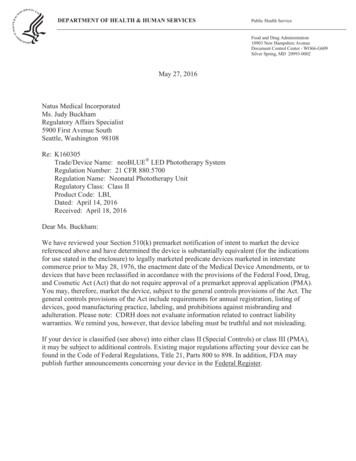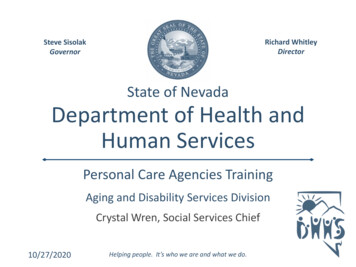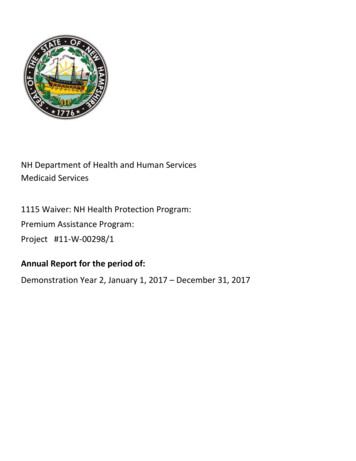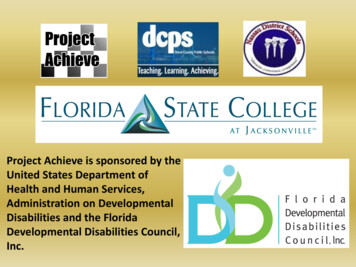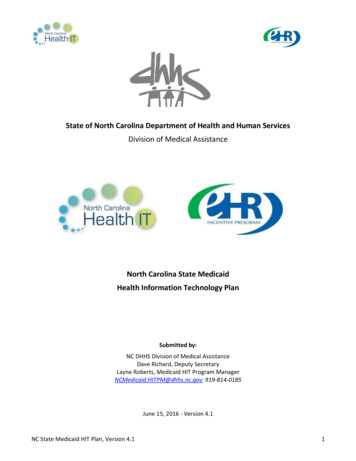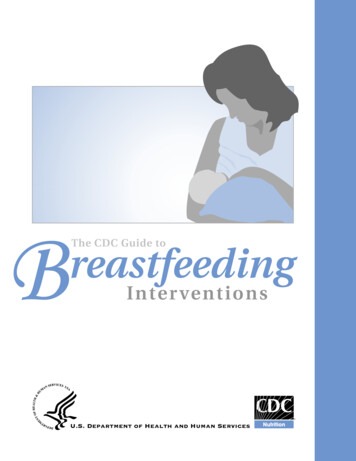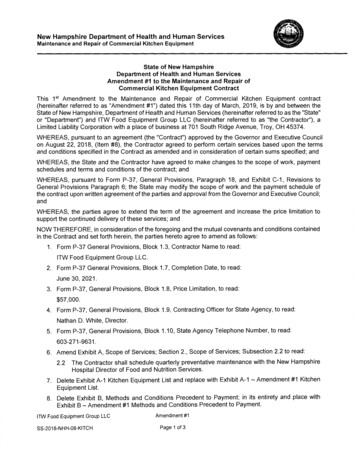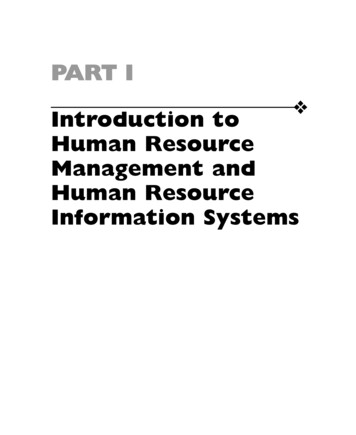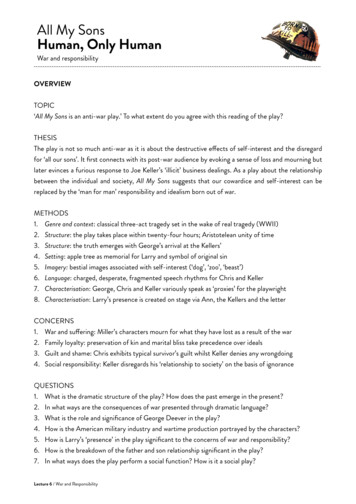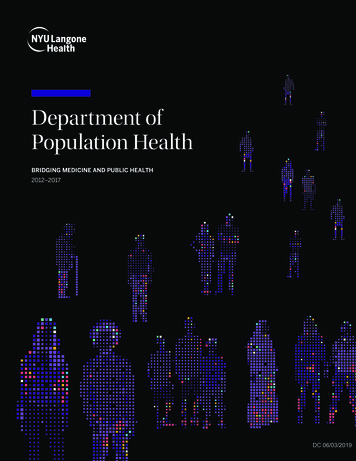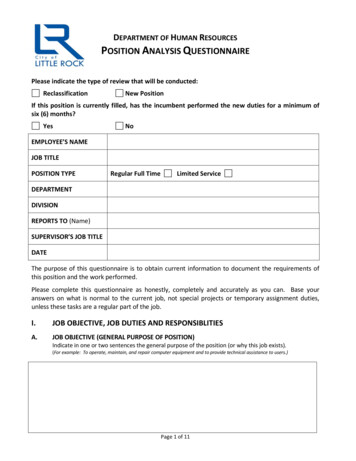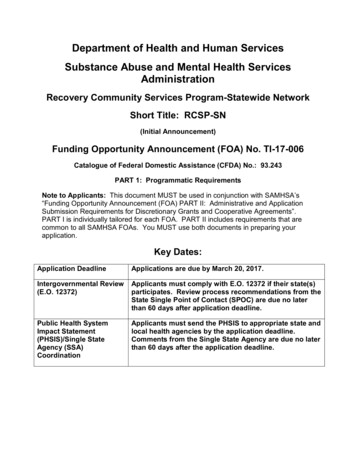
Transcription
Department of Health and Human ServicesSubstance Abuse and Mental Health ServicesAdministrationRecovery Community Services Program-Statewide NetworkShort Title: RCSP-SN(Initial Announcement)Funding Opportunity Announcement (FOA) No. TI-17-006Catalogue of Federal Domestic Assistance (CFDA) No.: 93.243PART 1: Programmatic RequirementsNote to Applicants: This document MUST be used in conjunction with SAMHSA’s“Funding Opportunity Announcement (FOA) PART II: Administrative and ApplicationSubmission Requirements for Discretionary Grants and Cooperative Agreements”.PART I is individually tailored for each FOA. PART II includes requirements that arecommon to all SAMHSA FOAs. You MUST use both documents in preparing yourapplication.Key Dates:Application DeadlineApplications are due by March 20, 2017.Intergovernmental Review(E.O. 12372)Applicants must comply with E.O. 12372 if their state(s)participates. Review process recommendations from theState Single Point of Contact (SPOC) are due no laterthan 60 days after application deadline.Public Health SystemImpact Statement(PHSIS)/Single StateAgency (SSA)CoordinationApplicants must send the PHSIS to appropriate state andlocal health agencies by the application deadline.Comments from the Single State Agency are due no laterthan 60 days after the application deadline.
Table of ContentsEXECUTIVE SUMMARY . 3I.FUNDING OPPORTUNITY DESCRIPTION. 41.PURPOSE. 42.EXPECTATIONS . 5II.AWARD INFORMATION . 12III.ELIGIBILITY INFORMATION . 12IV.V.VI.1.ELIGIBLE APPLICANTS . 122.COST SHARING and MATCH REQUIREMENTS . 13APPLICATION AND SUBMISSION INFORMATION . 131.ADDITIONAL REQUIRED APPLICATION COMPONENTS. 132.APPLICATION SUBMISSION REQUIREMENTS . 143.FUNDING LIMITATIONS/RESTRICTIONS . 154.INTERGOVERNMENTAL REVIEW (E.O. 12372) REQUIREMENTS . 15APPLICATION REVIEW INFORMATION . 151.EVALUATION CRITERIA . 152.REVIEW AND SELECTION PROCESS . 19ADMINISTRATION INFORMATION . 201.VII.REPORTING REQUIREMENTS . 20AGENCY CONTACTS . 20Appendix A – Sample Budget and Justification (no match required) . 21Appendix B – Certificate of Eligibility . 302
EXECUTIVE SUMMARYThe Substance Abuse and Mental Health Services Administration (SAMHSA), Centerfor Substance Abuse Treatment (CSAT), is accepting applications for fiscal year (FY)2017 Recovery Community Services Program-Statewide Network (Short Title: RCSPSN) grants. The purpose of this program is to further strengthen Recovery CommunityOrganizations (RCOs) and their statewide network of recovery stakeholders as keypartners in the delivery of state and local treatment and recovery support services, aswell as allied health systems through collaboration, systems improvement, public healthmessaging, and training conducted for (or with) key recovery stakeholder organizations.RCSP-SN grantees will collaborate with traditional substance use disorder (SUD)treatment providers to underscore the relevance and appropriateness of peer recoverysupport services (PRSS) as fundamental fixtures on the Recovery Oriented Systems ofCare (ROSC) landscape. This can be achieved through enhanced participation in stateand local government planning and efforts to participate on multilevel planning, policy,and program development councils. Recovery supports require further integration intostate and local systems of treatment and recovery service provision, which may befacilitated through increased emphasis upon capacity building, sustainabilitydevelopment, and identification of appropriate revenue streams to support theseactivities in the near and distant futureFunding Opportunity Title:Recovery Community Services ProgramStatewide NetworkFunding Opportunity Number:TI-17-006Due Date for Applications:March 20, 2017Anticipated Total Available Funding: 1.5 millionEstimated Number of Awards:Up to 10 awardsEstimated Award Amount:Up to 150,000 per yearCost Sharing/Match RequiredNoLength of Project Period:Up to 3 yearsEligible Applicants:RCOs that are domestic, private nonprofitentities in states, territories, or tribes.[See Section III-1 of this FOA for completeeligibility information.]3
Be sure to check the SAMHSA website periodically for any updates on thisprogram.IMPORTANT: SAMHSA is transitioning to the National Institutes of Health (NIH)’selectronic Research Administration (eRA) grants system. Due to this transition, SAMHSAhas made changes to the application registration, submission, and formatting requirementsfor all Funding Opportunity Announcements (FOAs). All applicants must register with NIH’seRA Commons in order to submit an application. Applicants also must register with theSystem for Award Management (SAM) and Grants.gov (see PART II: Section I-1 andSection II-1 for all registration requirements).Due to the new registration and application requirements, it is strongly recommended thatapplicants start the registration process six (6) weeks in advance of the application duedate.I.FUNDING OPPORTUNITY DESCRIPTION1.PURPOSEThe Substance Abuse and Mental Health Services Administration (SAMHSA), Centerfor Substance Abuse Treatment (CSAT), is accepting applications for fiscal year (FY)2017 Recovery Community Services Program-Statewide Network (Short Title: RCSPSN) grants. The purpose of this program is to further strengthen Recovery CommunityOrganizations (RCOs) and their statewide network of recovery stakeholders as keypartners in the delivery of state and local treatment and recovery support services, aswell as allied health systems through collaboration, systems improvement, public healthmessaging, and training conducted for (or with) key recovery stakeholder organizations.RCSP-SN grantees will collaborate with traditional substance use disorder (SUD)treatment providers to underscore the relevance and appropriateness of peer recoverysupport services (PRSS) as fundamental fixtures on the Recovery Oriented Systems ofCare (ROSC) landscape. This can be achieved through enhanced participation in stateand local government planning and efforts to participate on multilevel planning, policy,and program development councils. Recovery supports require further integration intostate and local systems of treatment and recovery service provision, which may befacilitated through increased emphasis upon capacity building, sustainabilitydevelopment, and identification of appropriate revenue streams to support theseactivities in the near and distant future.In addition to continuing to expand addiction RCOs and PRSS in the states, there isalso a pressing need to ensure the sustainability of the recovery infrastructuredeveloped to date through creative and diverse funding mechanisms and state,community, and private partnerships.The intent of the RCSP-SN grant program is to strengthen the relationships betweenRCOs and their statewide networks of recovery stakeholders as key partners in thedelivery of state and local treatment and recovery support services (RSS), as well asallied health systems through collaboration, systems improvement, public health4
messaging, and training conducted for (or with) key recovery stakeholder organizations.RCSP-SN grantees will collaborate with traditional SUD treatment providers and otherpurchasers of PRSS to strengthen and embed these critical service elements as fixtureson the Recovery Oriented Systems of Care (ROSC) landscape. In alignment with thegoals of SAMHSA’s Recovery Support Strategic Initiative, the desired outcomes of thisgrant program include: greater integration of RCOs on state and local planning councils;embedding peers into traditional SUD treatment and allied health services; working withState Medicaid Directors to modify plans which allow for the reimbursement of peerbillable services, and creation of other revenue sources within RCOs which facilitatefinancial solvency and long term sustainability. These can be facilitated through animproved emphasis on capacity building, sustainability development, and identificationof appropriate and diverse revenue streams that will support such activities in the future.Through this program, it is expected that the infrastructure of RCOs will be strengthenedand the delivery of addiction peer recovery services will be more meaningfullysupported.RCSP-SN grants are authorized under Section 509 of the Public Health Service Act, asamended. This announcement addresses Healthy People 2020 Substance Abuse TopicArea HP 2020-SA.2.EXPECTATIONSThe goals of the RCSP-SN program are to: 1) promote skills development with anemphasis on leadership, public relations and communications, and businessmanagement for RCOs; 2) identify and seek to address the training and technicalassistance (T/TA) needs of peer mentors/specialists (providers) and provide the supportneeded to ensure they are viewed as equal partners in the SUD/recovery supportdelivery system; 3) construct and promote, with state and local agencies, servicedelivery models that incorporate recovery supports before, during, after, and in lieu ofSUD treatment; and 4) establish business models that endorse and encouragesustainable mechanisms to enhance the long term viability for institutional providers ofRSS. To achieve the goals outlined above, the RCSP-SN grant program encouragesRCOs to work with state policymakers, other members of the addiction recoverycommunity, SUD service providers, and allied health system stakeholders to improveservices for individuals facing issues as a result of SUDs. Throughout the course of thegrant, the partnerships, programs, and recovery supports that have been developed willbe provided technical support to ensure that they are financially sustainable post-award.The grant requires that the Project Director and Co-Director, at a minimum, bedesignated as key staff to support the activities identified in your proposal and ensurethat people in recovery will be involved in program/service design, development,implementation, and evaluation. While there are no minimum level of effort (LOE)requirements in this grant, your budget and budget justification should adequatelydemonstrate how you intend to execute the deliverables outlined in your proposalthrough use of the proposed staffing pattern.5
NOTE: In order to strengthen and expand the impact of this program across the nationand ensure broad geographic distribution, SAMHSA will make only one award per state,territory, or tribe. If multiple applicants in the same state, territory, or tribe are in thefundable range, only the highest scored applicant will be given an award.2.1Required ActivitiesThe RCSP-SN grant funds must be used primarily to support the infrastructuredevelopment of RSS and to engage in activities that encourage RCO collaboration andintegration with other behavioral health and primary care providers. Applicants areexpected to choose a minimum of three activities in bold from the infrastructuredevelopment activities and/or the RSS access and integration activities lists below asfocal points of their proposed grant activities. The designation of three activities ismeant to suggest a minimum level. Applicants are welcome to choose more than threeactivities.INFRASTRUCTURE DEVELOPMENT ACTIVITIES: Applicants are expected to chooseat least two of the seven activities in bold from the list below to develop infrastructure intheir state.1. Work to forge relationships with state and local planning and policydevelopment committees to ensure membership on such committees orworkgroups so that RCOs and other recovery stakeholders are represented instate and local SUD and collaborative recovery support planning processes;2. Partner with state and local organizations in workforce development activities,such as:o developing peer certification standards of addiction peer recoverysupport/recovery coach services that are aligned with best practices;o developing culturally and linguistically competent peers, providers, andadministrators;o providing addiction peer recovery coach training for providers on how toincorporate peers into their workforce while inculcating a recovery orientedculture consistent with ROSC principles;o facilitating contracts between RCOs and logical purchasers of peer services(e.g. justice, housing, hospitals, SUD treatment providers);o developing strategies to ensure accreditation of RCOs in the state;o facilitating the collaboration of recovery residences with RCOs and statewiderecovery networks and SUD and allied health providers, as appropriate;o facilitating collaboration with mental health consumers and familyorganizations to foster common goals; ando providing educational materials and toolkits to State Medicaid offices whichencourage State Plan modifications which make peer reimbursement possibleto support RCO and peer sustainability.6
3. Develop linkages with addiction RCOs throughout the state in order to:o develop a shared approach around promoting addiction peer recoverysupports and services;o identify needs of the addiction recovery community and devise strategies toaddress these needs; ando promote the collaboration of RCOs and statewide recovery networks toleverage resources among mission-similar institutions while enhancing thestate’s recovery support network.4. Serve as a catalyst for organizational/structural change among recoveryoriented institutions by providing training for and promoting the importanceof:o strengths-based, person-centered, and trauma-informed peer support andincreased elevation of the importance of these issues;o integration of statewide medication assisted treatment and Opiate OverdosePrevention programing with recovery supports, and their strategic marketing,outreach, and engagement efforts within allied systems of care; ando the availability and expansion of addiction PRSS, such as mutual aid groups,peer mentoring/coaching, and responsiveness to needs based on gender,race, and ethnicity.5. Participate in policy, planning, and program development discussions at thestate, community, and local level to ensure adequate recovery supportthrough policy and program development that overcome traditional barriers tovulnerable populations, such as:o veterans and military families;o criminal justice re-entry populations;o sexual and gender minorities;o individuals with co-occurring mental health and other primary healthconditions;o individuals with histories of chronic homelessness;o youth in transition/young adults;o racial and/or ethnic minorities; ando tribal communities.6. Work with SSA and State Medicaid offices on issues which support greaterRCO/RSS financial sustainability by taking a leadership/catalyst role infacilitating RCO contracts, Medicaid and state insurance reimbursement, andthe forging of managed care organization (MCO)-RCO payor relationships.7. Work with RCOs and SUD-focused peer organizations within astate/territory/tribe to document the efficacy and cost savings accruedthrough utilization of peer recovery coaches and the provision of otherrecovery supports (e.g., recovery community centers, recovery housing)within SUD treatment and allied systems of care.7
HEALTH ACCESS AND RSS INTEGRATION ACTIVITIES: Applicants are expected tochoose at least one of the three access or integration related activities in bold from thelist below.8. Promote the use of PRSS in integrated primary care and within more recentlydeveloped community behavioral healthcare models [e.g., Health Homes,Federally Qualified Health Centers (FQHCs), Certified Community BehavioralHealth Clinics (CCBHCs)].9. Partner with health insurance coverage, outreach, and enrollment assistanceprograms operating in the state to inform and supplement their outreachefforts to populations with SUDs, promoting RSS as necessary components toa SUD focused system of care.10. Facilitate education/training efforts regarding mental health and addictionsparity to increase awareness/understanding of the law (Mental Health Parityand Addiction Equity Act of 2008), with a specific focus on health care reformand integrated care.Other Expectations:During the first year of the grant, SAMHSA/CSAT will provide post-award technicalassistance to help grantees construct a recovery support “asset map” to identify areaswhere recovery supports exist and are lacking in their state/jurisdiction. Grantees will beexpected to use the asset map as a tool throughout the life of the grant to build capacityof RSS in those areas. Guidance for the asset mapping is in development and will beprovided to grantees in the first year of their awards.If your application is funded, you will be expected to develop a behavioral healthdisparities impact statement no later than 60 days after your award (See PART IIAppendix E, Addressing Behavioral Health Disparities).Although people with behavioral health conditions represent about 25 percent of theU.S. adult population, these individuals account for nearly 40 percent 1 of all cigarettessmoked and can experience serious health consequences 2. A growing body of research1Substance Abuse and Mental Health Services Administration, Center for Behavioral Health Statisticsand Quality. (March 20, 2013). The NSDUH Report: Adults with Mental Illness or Substance Use DisorderAccount for 40 Percent of All Cigarettes Smoked. Rockville, df2U.S. Department of Health and Human Services. The Health Consequences of Smoking: 50 Years ofProgress. A Report of the Surgeon General. Atlanta, GA: U.S. Department of Health and Human8
shows that quitting smoking can improve mental health and addiction recoveryoutcomes. Research shows that many smokers with behavioral health conditions wantto quit, can quit, and benefit from proven smoking cessation treatments. SAMHSAstrongly encourages all grantees to adopt a tobacco-free facility/grounds policy and topromote abstinence from all tobacco products (except in regard to accepted tribaltraditions and practices).Recovery from mental and/or SUDs has been identified as a primary goal for behavioralhealth care. SAMHSA’s Recovery Support Strategic Initiative is leading efforts toadvance the understanding of recovery and ensure that vital recovery supports andservices are available and accessible to all who need and want them. Building onresearch, practice, and the lived experiences of individuals in recovery from mentaland/or substance use disorders, SAMHSA has developed the following workingdefinition of recovery: A process of change through which individuals improve theirhealth and wellness, live a self-directed life, and strive to reach their full potential. g-Definition-of-Recovery/PEP12RECDEF for
RCOs to work with state policymakers, other members of the addiction recovery community, SUD service providers, and allied health system stakeholders to improve services for individuals facing issues as a result of SUDs. Throughout the course of the grant, the partnerships, programs, and recovery supports that have been developed will
